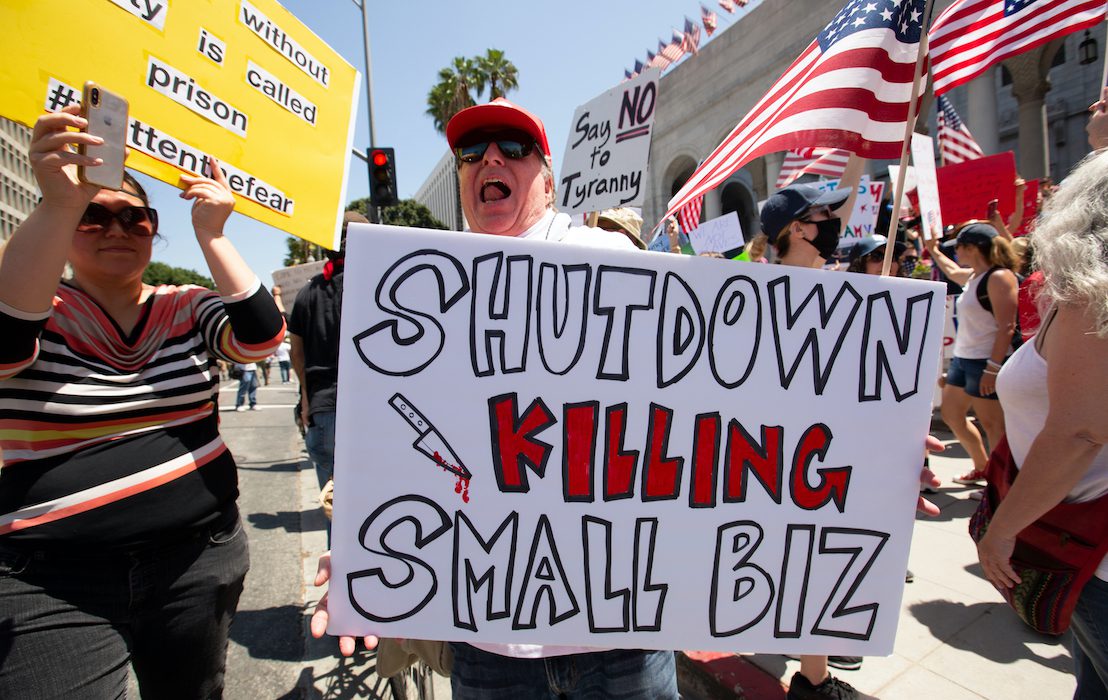Conserving Freedom in Times of Crisis

America has not seen a genuine crisis in over a decade. The descent of Covid-19 on our nation, therefore, shocked many. Even more shocking were the actions the government took to prevent a health crisis. State officials mandated masks, enforced lockdowns, closed churches, and arrested psalm singers, because they no longer trusted citizens to care for themselves. If they had, these measures would never have been mandated, only recommended.
Not only has state trust in citizens vanished, but citizens have also stopped trusting themselves, and begun to look to those in government not as their representatives but as experts with solutions for every problem. The challenge of Covid is a monumental one. But the paternalistic authoritarianism of our officials and the ready acceptance of a horde of decrees by so many Americans has introduced a new problem—complacency before a continual loss of liberty.
America is not the first country to be forced to wrestle with this. In 1961, British economist Alan Peacock wrote, “People will accept, in a period of crisis, tax levels and methods of raising revenue that in quieter times they would have thought intolerable, and this acceptance remains when the disturbance itself has disappeared.”
Economist Robert Higgs coined the term “ratchet effect” to visualize the change in power dynamics brought about by political response to crises. While government control may subside somewhat after the conclusion of a crisis, it still remains higher than its original level. As Higgs writes, “Under conditions widely agreed to constitute a national emergency, especially during great wars or exigencies likened to them in character or seriousness, twentieth-century Americans both expect and desire the government to ‘do something,’ and to do it immediately.”
The pandemic will certainly not be the last crisis this country will face. To better prepare for the future, we should look to the past. Expanding government intervention often ignores certain principles of natural law. We can use these criteria as a test, to judge the legitimacy of a given use of power in a time of crisis. To consider an emergency state action moral, it should meet all four of the following criteria.
First, it should be clear that subsidiary agencies are insufficient to meet the challenge. Lord Acton famously noted the tendency of a government to grow its power. For a given level of government, whether state or federal, to truly help during a crisis, it must wield power only when those institutions closer to the problem are unable to solve it.
Second, the action must be necessary for the protection of the public good and preservation of liberty. Some freedoms must be suspended in some emergencies in order to ensure the long-term safety and welfare of the nation. The end of government is the good of the community, as Locke argued. This public good is by nature subjective. If the exercise of emergency power causes strife between the government and the people, the legitimacy of that use of power should be determined by an analysis of the “good or hurt of the people.”
Third, the action must be constitutional. There are limits on the means a government can employ in its pursuit of public good, and it must be consistent with its own constitution. According to John Locke, prerogative powers can be “employed for the benefit of the community and suitably to the trust and ends of the government” (emphasis added). The trusts and ends of the American government are detailed in the Constitution.
The fourth rule is the most difficult in practice: Any liberties suspended during the crisis must be reinstated when the crisis is over. No crisis is so critical as to require a government to permanently suspend civil liberties, or permanently expand in size. When the crisis is over, power must be returned to its owners, whether private citizens, municipalities, or states. Robert Higgs quantitatively shows that this is the criteria which our government has most often failed.
All four criteria are applicable to our present crisis. During the coronavirus pandemic, the U.S. government ignored the first, third, and fourth criteria. Governors and officials decreed unilateral solutions without local consultation. They failed to use power constitutionally, and they refused to return their powers at the promised date—two weeks after the first lockdowns.
The legislation following the 9/11 attacks demonstrates how quickly our freedoms can vanish in the name of safety. It may be easier for Americans to seek any and all government help in a time of crisis, regardless of the freedoms they exchange for supposed security, but to do so risks losing sight of why our government was created. Americans ought to wrestle with their problems as citizens, working with their communities, growing stronger both individually and as a country as they conquer them. It is difficult to overcome such civic passivity in the face of government overreach, but with the help of a philosophically grounded framework, Americans can realize their obligation to stand up for freedom even in a time of crisis.
Grace Hemmeke was a member of the Acton Institute’s 2021 Emerging Leaders class. She is a senior at Concordia University majoring in Hospitality and Event Management.
Jeremy Ward was a member of the Acton Institute’s 2021 Emerging Leaders class. He is a recent graduate of the University of South Carolina Honors College, where he majored in Economics. Upon graduation, he was given the top economics award for his class by the Darla Moore School of Business.
Ben Luker was a member of the Acton Institute’s 2021 Emerging Leaders class. He is a junior at Calvin University majoring in Politics, Philosophy, and Economics. He is planning on attending law school after graduation.